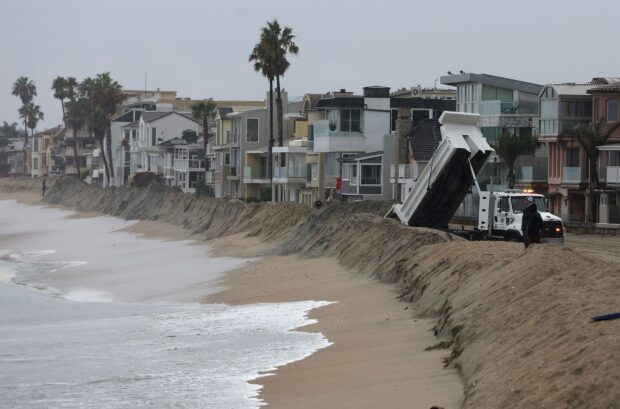Tropical Storm Hilary made landfall along the Baja peninsula Sunday, with the rare Pacific storm set to pummel Northern Mexico, Southern California and the U.S. Southwest with torrential rains and strong winds, potentially racking up damages of over $2 billion.
California Governor Gavin Newsom declared an emergency and mobilized the National Guard and state crews, with the National Weather Service warning of excessive rainfall that could potentially trigger mudslides and flash floods and down trees and power lines. The storm, which was downgraded from a hurricane earlier on Sunday, has triggered California’s first-ever tropical storm warning.
Rain was falling across Baja California, Mexico, and parts of Southern California, with the brunt of the storm expected to hit later in the day and overnight. One person was reported to have drowned in Mexico when a car was swept away in an overflowing stream, the Associated Press reported, and there has already been some flooding along the Baja peninsula.
While there will be some wind damage across the region, the worst impact will be from the flooding rains, which could cause losses in the U.S. ranging from $1 billion to $2 billion, Chuck Watson, a disaster modeler with Enki Research said in a blog post.

“Rain is obviously the biggest story,” said Bill Deger, a meteorologist with commercial-forecaster AccuWeather Inc. While rain amounts could vary from as much as 4 inches in Los Angeles and San Diego to 20 inches in parts of Mexico, “it is certainly going to be enough to cause life-threating flooding.”
Hilary could bring a year’s worth of rain in a day to some areas, and could even break records in some areas, forecasters said, in the latest bout of severe weather around the world. In the last 10 years, flooding has caused the most deaths from tropical systems in the US.
At a press conference on Sunday, Los Angeles Mayor Karen Bass declared a local emergency and urged residents to “stay safe, stay home and stay informed.”
Janice Hahn, chairperson of the Los Angeles County Board of Supervisors, warned residents of the risk that the heavy rain will knock out power lines or topple trees onto roads or other structures. She urged local shops to close and businesses to let employees work from home on Monday so they won’t have to get on the road, and also advised people against going to the beach to watch the storms.
“At this point if you haven’t moved from where you are, stay where you are,” she said in an interview on 97.1 KNX News.
San Diego closed beaches and issued similar warnings, urging people to stay off the roads and to take other precautions.
Adding to concern, a magnitude 5.1 earthquake shook Ojai, California, at 2:41 p.m. local time Sunday, according to the United States Geological Survey. No tsunami alert was issued for Southern California, the National Weather Service Los Angeles said in a tweet.
To track the latest path of Hilary, click here.
In Mexico, President Andres Manuel Lopez Obrador said the government is working to reestablish communications in several locations in Baja California state, after Hilary brought heavy rains.
At least 1,725 people were evacuated by the government in the peninsula and sent to 35 shelters in the localities of Mulegé, Los Cabos, Comondú, Loreto and La Paz, according to Milenio. The governor of the state was considering declaring a state of emergency, while military personnel visited affected areas.
In and around the U.S., hundreds of flights have been canceled, the vast majority of them either originating from or destined for West Coast airports including Los Angeles, Las Vegas and San Diego, according to FlightAware, an airline tracking service. MetroLink commuter rail around Los Angeles has reduced service Sunday, as has San Diego’s Coaster service.
Some roads in Southern California have also been closed. Hilary will continue to weaken and likely remain a tropical storm as it moves north later Sunday, Deger said.
Regardless of its status, it will still drop heavy rain, especially in the mountains. Flood watches and warnings stretch across California to Idaho, the National Weather Service said. By Tuesday, the worst should have passed.
In addition to Hilary, Tropical Storms Emily and Franklin have formed in the Atlantic, alongside a unnamed tropical depression, the hurricane center said. Franklin is forecast to strike Haiti and the Dominican Republic on Tuesday, bringing heavy rains and dangerous flooding. Emily and the depression will drift harmlessly out to sea.
(Updates with earthquake information in the 11th paragraph.)
–With assistance from Sarah McGregor and Fabiola Zerpa.
Featured image: Workers build a sand berm outside of beachfront homes in Long Beach, California, on Aug. 20. (Bloomberg)





















 Chubb CEO Greenberg on Personal Insurance Affordability and Data Centers
Chubb CEO Greenberg on Personal Insurance Affordability and Data Centers  What Analysts Are Saying About the 2026 P/C Insurance Market
What Analysts Are Saying About the 2026 P/C Insurance Market  Flood Risk Misconceptions Drive Underinsurance: Chubb
Flood Risk Misconceptions Drive Underinsurance: Chubb  Beazley Agrees to Zurich’s Sweetened £8 Billion Takeover Bid
Beazley Agrees to Zurich’s Sweetened £8 Billion Takeover Bid 




